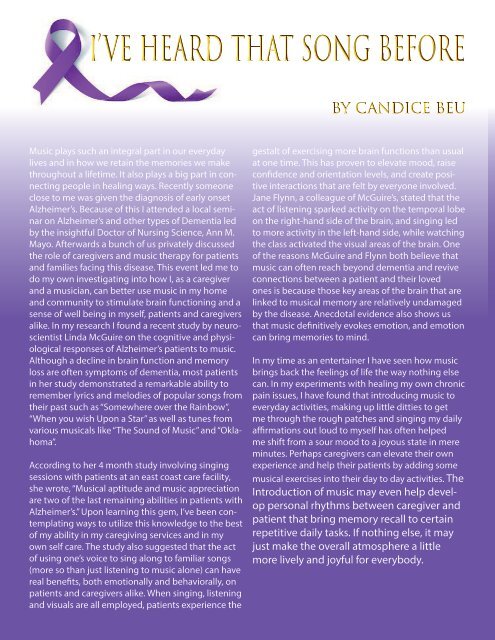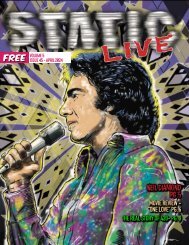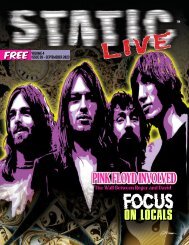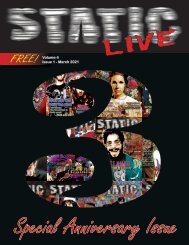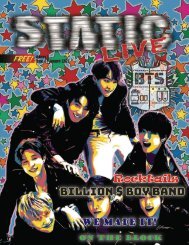Static Live Magazine February 2019
You also want an ePaper? Increase the reach of your titles
YUMPU automatically turns print PDFs into web optimized ePapers that Google loves.
IFSTEI’OOHA’VRNARVEEEDTG HEARD THAT SONG BCEAFNODRBIE<br />
BECBYUEY CANDICE BEU<br />
Music plays such an integral part in our everyday<br />
lives and in how we retain the memories we make<br />
throughout a lifetime. It also plays a big part in connecting<br />
people in healing ways. Recently someone<br />
close to me was given the diagnosis of early onset<br />
Alzheimer’s. Because of this I attended a local seminar<br />
on Alzheimer’s and other types of Dementia led<br />
by the insightful Doctor of Nursing Science, Ann M.<br />
Mayo. Afterwards a bunch of us privately discussed<br />
the role of caregivers and music therapy for patients<br />
and families facing this disease. This event led me to<br />
do my own investigating into how I, as a caregiver<br />
and a musician, can better use music in my home<br />
and community to stimulate brain functioning and a<br />
sense of well being in myself, patients and caregivers<br />
alike. In my research I found a recent study by neuroscientist<br />
Linda McGuire on the cognitive and physiological<br />
responses of Alzheimer’s patients to music.<br />
Although a decline in brain function and memory<br />
loss are often symptoms of dementia, most patients<br />
in her study demonstrated a remarkable ability to<br />
remember lyrics and melodies of popular songs from<br />
their past such as “Somewhere over the Rainbow”,<br />
“When you wish Upon a Star” as well as tunes from<br />
various musicals like “The Sound of Music” and “Oklahoma”.<br />
According to her 4 month study involving singing<br />
sessions with patients at an east coast care facility,<br />
she wrote, “Musical aptitude and music appreciation<br />
are two of the last remaining abilities in patients with<br />
Alzheimer’s.” Upon learning this gem, I’ve been contemplating<br />
ways to utilize this knowledge to the best<br />
of my ability in my caregiving services and in my<br />
own self care. The study also suggested that the act<br />
of using one’s voice to sing along to familiar songs<br />
(more so than just listening to music alone) can have<br />
real benefits, both emotionally and behaviorally, on<br />
patients and caregivers alike. When singing, listening<br />
and visuals are all employed, patients experience the<br />
gestalt of exercising more brain functions than usual<br />
at one time. This has proven to elevate mood, raise<br />
confidence and orientation levels, and create positive<br />
interactions that are felt by everyone involved.<br />
Jane Flynn, a colleague of McGuire’s, stated that the<br />
act of listening sparked activity on the temporal lobe<br />
on the right-hand side of the brain, and singing led<br />
to more activity in the left-hand side, while watching<br />
the class activated the visual areas of the brain. One<br />
of the reasons McGuire and Flynn both believe that<br />
music can often reach beyond dementia and revive<br />
connections between a patient and their loved<br />
ones is because those key areas of the brain that are<br />
linked to musical memory are relatively undamaged<br />
by the disease. Anecdotal evidence also shows us<br />
that music definitively evokes emotion, and emotion<br />
can bring memories to mind.<br />
In my time as an entertainer I have seen how music<br />
brings back the feelings of life the way nothing else<br />
can. In my experiments with healing my own chronic<br />
pain issues, I have found that introducing music to<br />
everyday activities, making up little ditties to get<br />
me through the rough patches and singing my daily<br />
affirmations out loud to myself has often helped<br />
me shift from a sour mood to a joyous state in mere<br />
minutes. Perhaps caregivers can elevate their own<br />
experience and help their patients by adding some<br />
musical exercises into their day to day activities. The<br />
Introduction of music may even help develop<br />
personal rhythms between caregiver and<br />
patient that bring memory recall to certain<br />
repetitive daily tasks. If nothing else, it may<br />
just make the overall atmosphere a little<br />
more lively and joyful for everybody.<br />
static-magazine-template Feb 19.indd 22<br />
<strong>2019</strong>-01-28 1:27:02 PM


